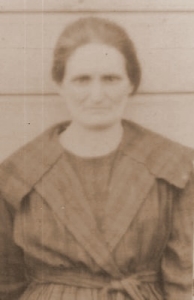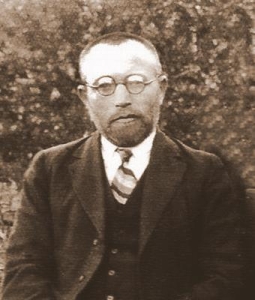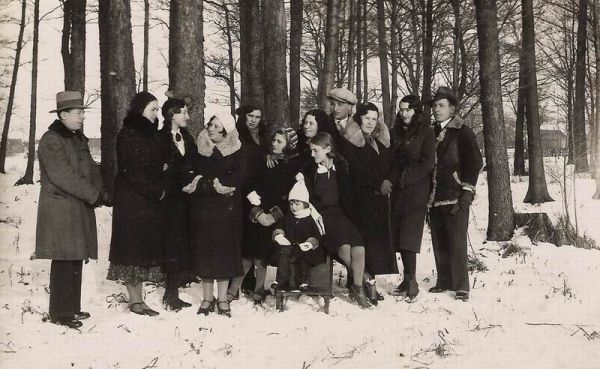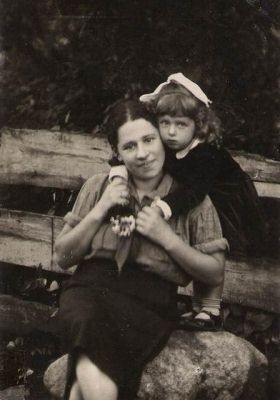Rachel Vitkin: On the shelves were the carving knives - grandfather's “tools”. He was a ritual slaughterer, namely a shochet u'bodek[1]. In the drawer were grandmother's wigs. In the kitchen there was always salted meat on the board.
Batya Levitt: I used to go to your grandfather to get the chicken slaughtered and he would always start looking for something. He would turn to the grandmother and ask, “Dvora, where's the dos (whatsit in Yiddish)?” meaning the carving or butcher's knife. I remember that he used to be called Reb Shaul-Dovid, Der Dos.
Rivka: I don't remember this. I guess in our presence they didn't dare call him that.
Rachel: When I visited South Africa, I was invited to a Dusiater party. There they live on nostalgia. Someone called Tony, asked me: “What, you don't know Reb Shaul- Dovid, Der Dos?” And when I told him that Reb Shaul-Dovid was my grandfather, he turned bright red… Mottel (Mordechai) Yoffe, the writer, wrote about grandfather – Der Dos.
Rivka: They would come for advice from grandfather. When they had a question, they would ask him. He also had a blessing against the evil eye. When a child would get sick, his mother would bring his hat, or another piece of clothing to grandfather. And grandfather would hold it and say the blessing and the mother would run home fast to put it on her child so he or she would get cured fast…
Rachel: A couple who were about to separate would come to grandfather. He would sit with them day and night trying to bring peace between them.
Rivka: When grandfather would sit studying, I would study with him and there were many chapters that I knew by heart.
Tzila Gudelsky: I remember his figure, a white beard…
Rachel: He would wear a white kittel and a black belt. He would put his hands on the childrens heads and bless them. Father and grandfather would go to synagogue together…
Rivka: And we stayed home and we prayed and we cried…
|
|
||
| Itel Shub daughter of Dov-Berl Zilber and Rivka-Golda Died at the age of 52 on 3rd Adar 5686 (February 17, 1926) |
Naftali Shub son of Reb Shaul-David and Devora |
Rachel: Mother, of blessed memory, passed away when I was ten. I remember well the day of her death. It was before Purim. Mother was sick and the day before she passed away she asked to be taken to the pharmacist who lived in the village not far from the shtetl. Granted there was snow outside, but it was a nice bright clear day. The horses were harnessed to the sleigh and they left. When they came back, mother was very tired and lay down to rest. She woke up at three o'clock in the afternoon, her condition worsening. She was in great pain and Yosef Poritz, who took care of her so diligently, called Dr. Druyan. I remember that they did not leave her bed until four o'clock in the morning.
I was in the room that whole time. Holding on to the leg of the bed, it was impossible to detach me. I remember father, how he literally took leave of mother, and mother could barely get a word out of her mouth.
Rivka: Don't you remember that mother practically died in my hands? Dr. Druyan, who was such a dedicated doctor, gave her a shot and I remember mother thanking him. Clearly, she said, “Thanks,” and tears ran down from her eyes. She asked father, “Naftali, vos vet zein mit di kinder (What's going to be with the children)?”
Afterwards there was a funeral. Our yard was full of people. The three closest houses - the one belonging to Ziv, ours, and Kagans - created sort of a yard and it was filled with a sea of people. I don't think anyone was left at home. The whole town gathered over there. After the funeral, all of us sat in our parent's bedroom and father asked, “What will be?” …
It must be noted that everything was done to try to save mother. Thanks to mother's brother, Uncle Shaye (Yeshayahu Zilber), who had the title Dr. Professor and who then lived in Berlin, mother was brought to Germany in the hope that some cure would be found for her there, but it was in vain.
After mother's death, our sister Batya, who was then only sixteen years old, took over the burden and took care of us all. She literally sacrificed herself for us. Only after we all grew up did she leave for hachshara (training). My daughter has my sister's name and I explained to her that Batya was just like a mother to us.
Mother was blonde, a tall thin woman. I remember her working, always as busy as a bee. The house was full of children, and mother always working. She was especially busy washing our hair…
Rachel: We all had braids, can you imagine how hard that was!
Rivka: We had a Jewish helper from Antaliept. It was not right for a Jewish woman to work as a servant in her own town. In our yard we had a cow. The helper would milk and mother would prepare cheese. Our cow was special. She would always try to gore people and was always identified and pointed out as Naftali's cow… Mom was very fast and she had a special talent for doing everything. And with it all she was a very quiet woman and always had time to listen. The children were always very neat.
Rachel: The relationship between mother and father was excellent!
Rivka: I used to tell that to my children. And I used to tell them that I do not remember either father or mother ever raising their voice.
Rachel: There wasn't any time that they raised a hand at us.
Batya Levitt: That was really an exemplary family.
Rivka: Father would help a lot. I remember that on market day, although he was busy in our store for leather goods, father would help with the shopping. He also helped us after mother passed away. He would prepare and check shoes and socks…
When mother passed away, grandfather and grandmother were no longer alive and Aunt Sheine (mother's sister) kept an eye on us. Her husband was the melamed, Avram-Moishe Schmidt. I remember that she took care that we would look nice and she would point, saying to father, “Please buy this cloth for the girls' dresses…”
Rachel: Aunt Sheine remembered everybody's birthday. Everyone would go over to her and ask, “Vifl yohr bin ich?” (How old am I)
Rivka: Uncle Avram-Moishe was a scholar of the Talmud. He taught in the cheder and he read a lot. He had the habit of “snatching” a book out of the hands of the reader. When someone was reading a newspaper, he would go over and literally snatch the paper out of his hands… He would read quickly on the sly.
Tzila: I remember him grabbing the book “Sanin” from me, a book that passed from hand to hand. Literally pornography! Uncle's criticism of the book was of anger. “Monsayech?”[2] “Damn,” he would mumble against the author, “if you don't know, don't write and don't ruin the youth.”
Father was a very handsome looking man and his appearance inspired dignity. The worst thing for us was when they threatened, “We'll tell father.” We had a lot of respect for him. I was very wild and they would call me, “De Vilde Tzilke” (The Wild Tzilke.” When I saw a book by that name, I burst into tears.
Rivka: We were all very temperamental. We were always running.
I have letters from Father from 1938 filled with fear about the bloodshed in Eretz Yisrael and sadness at the losses at Kibbutz Ramat Hakovesh, and Father warning us not to be on the roads.
I also cherish our sister Chava's letter with her beautiful handwriting just like pearls with the opening words: Dusiat Diaspora…
Tzila: Chava was a young lady with a poet's soul.
Rachel: She was a personality unto herself. She had a talent for writing and she carried on a correspondence with Uncle Katriel Shub in America. It was a big blow to her when her good friend Honke Glick drowned in the lake. Chava was very pedantic and compulsive about cleanliness. She worked as a bookkeeper in a bank and helped with the upkeep of the house. Chava wanted very much to immigrate to Eretz Yisrael but I must sadly admit that she was prevented from doing so. She was not strong, she was thin and we were afraid that she would not be able to survive the harsh conditions.
Tzila: And our sister Batya, she was a beautiful and full girl. She had many suitors and I remember that Berl Levitt was very friendly with her. And Yitzchak Yoffe, the miller's son wanted her very much.
Rivka: I guess she just lacked a dowry.
Tzila: Yitzchak suggested that Father ask Uncle Katriel to send 500 lit so that they could get married but Batya refused adamantly!
Rivka: Our brother Dov was very active in Hashomer Hatzair. When he started smoking, it was demanded of him that he stop. He refused and he was forced to leave the movement… He studied bookkeeping in Utian (Utena) and worked in the profession in Ponevezh (Panevezys).
Tzila: Dov was the only son. He was tall and handsome. He had a talent for drawing. He would forge the signatures of the government ministers. He would draw signboards. He wrote for the newspaper Idishe Shtime. He was very close to father and was spoilt. When he was studying in Utian he would hurry home because he missed it…
Rivka: Our little sister, Hene-Liebele was different. She was dark-skinned and dark- haired, not like her blonde sisters…
The house was traditional and kosher. When grandfather passed away, Father continued in the tradition but he understood that a new wind was blowing then. He would return on Shabbat from synagogue and if he saw the iron in the kitchen, he would walk out and turn a blind eye. He knew he could not fight us. We were members of Hashomer Hatzair, “treifemekers”[3], but we would not sin in front of our father.
Tzila: We turned over a new leaf. We had dared to disobey tradition, but we did not do it in front of the adults. I remember that at age fifteen I was taught to eat treif. We were in the woods and they put a piece of non-kosher salami between two pieces of bread. And I ate it. On the way back home I was afraid that the sky would open up and a disaster would occur. When I got home I was afraid that father would see something on me. Apparently, my fear showed on my face because father asked me, “What happened to you?” I really thought that something awful would happen! But, nothing did.
Rachel: I remember Sukkoth. There was a permanent sukkah attached to the house. You just had to cover it with sehach (palm branches). There was a bed on which grandfather would sleep. When the men arrived with the ethrog and the lulav, the women would stand in line in order to smell them… Everyone would sit in the sukkah and sing. The women would serve their dishes and there would be a communal meal. The sukkah was filled with people and so were the rooms and the hall. And what would they sing? Everything! And naturally, songs of Eretz Yisrael. After all from the age of six we already belonged to the Zionist movement.
Tzila: Rachel had a marvelous voice. I was sure that in Eretz Yisrael she would become a professional singer.
Rachel: Yankele Charit was already a student, and he came to talk to us in the youth movement. I remember that he would not start until I had sung. We especially loved the songs of Rachel (the poet) such as “Perhaps” and “Kinneret”, and “Jerusalem” of the poet Avigdor Hameiri. Together with Noah Poritz, I loved to sing “A Mother's Letter to her son in Eretz Yisrael”.
Rivka: We were instilled with a yearning for Eretz Yisrael. All the discussions in the youth movement revolved around Eretz Yisrael. We lived in Lithuania, but inside we were all in the Land of Israel. We knew we belonged there. We would sing in Yiddish, “My heart is in the east, but I'm in the west,” and the tears would run down our cheeks. We dreamed only of Eretz Yisrael.
I remember Meir Levitt who left Eretz Yisrael and returned to Lithuania. He told us that there was no work, no place to live, but we did not relate to these stories. The pioneers did not beautify the conditions in the country. They described it exactly the way it was. But that did not diminish, not even one percent, from our will to make aliya, to immigrate to Eretz Yisrael
Anti-Semitism? I remember a trip to Zarasai when the goyim conspired against us. But we had self-preservation. Our young men would hide sticks under their clothing and the goyim were afraid to start up with us.
|
|
|
Young Cousins of the Shub and Levitt families In front: The children Tzilka Shub and her young sister Hene-Libale, and little Batya-Babale Barolski |
|
|
Rivka: During that period there were not too many children in the shtetl and therefore we especially loved Babale.






